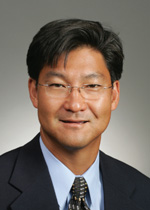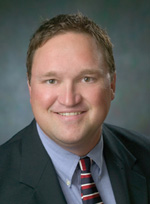
Alexander Pak, Mid America Heart & Lung Surgeons
Most any medical professional will tell you that successful health outcomes are often closely linked to the quality of a relationship with the patient. Alexander Pak gets that, but a cardiac surgeon often meets a patient for the first time when he’s on the operating table—if the patient is conscious at all.
“The relationships often are fairly brief,” said Pak, who works for a joint venture owned by North Kansas City Hospital and Saint Luke’s Health System. “Sometimes, I don’t formally meet a patient because they’re in an unconscious state, and afterwards, their long-term follow-up many times is taken care of by a cardiologist or pulmonologist, so our exposure to patients can be brief.”
But with the success stories, there are often cases where some-one will drop by the office long after treatment to thank Pak for the life-saving—or life-changing—work he’s done. “A certain number often stop by just to say hello, or tell me ‘I’m still kicking.’” Pak says.
The Chicago native started his medical career in LaCrosse, Wis., and he would use Kansas City as a rendezvous point when getting together with his brother from Springfield. As is often the case, the KC magic set the hook. Pak and his wife, Wendy, decided to take the next opportunity to live here, and they’re raising three children.
Now director of cardiac surgery at North Kansas City Hospital, he splits time with Saint Luke’s. It can be challenging serving two masters, he acknowledges, but there are some benefits.
“Sometimes it can be difficult to collaborate with competitors, but we worked out this arrangement and it’s working out pretty well,” he said. “By sharing resources, you don’t need so many doctors, so there is some economy in our practice and benefit to the hospitals.”
The rewards of his work, he says, can be measured in the additional days of life he helps provide to his patients. “Often, the consequences of what we do are life and death—with some patients, you’re literally holding their heart in your hands,” Pak said.
“It’s a privilege to be in that position,” he said. “I always remind myself that this person put his life in my hands and their loved ones have trusted you with their family member’s life—that’s how I view every encounter.”

Kevin Dishman, Stormont-Vail Regional Medical Center
In a tremendous majority of cases, physicians like Kevin Dishman say their ability to improve the lives and health of their patients flows directly from the support they had at home. Julie Dishman, he says, “is the most important thing in my life, and she allows me to do what I do. She’s been the single parent because I haven’t been there, and she’s run the race by herself because I haven’t been there.”
Her support has allowed him to focus on his duties as assistant chief medical officer, director of the hospitalist program and senior leadership team member for Stormont-Vail Regional Medical Center in Topeka. An internal-medicine specialist by training, Dishman deals with an array of complex cases—often with multiple disorders that mask, amplify and complicate one another. Addressing the needs of those patients requires an attribute not generally considered a positive workplace trait: “Dealing with those problems in detail, you have to be a very compulsive person, not taking everything at face value,” he says. “Beyond empathy and things we always talk about, one of the key things with internal medicine is being thorough.”
It’s detective work, really. And it’s a specialty a lot of people who know him didn’t fully appreciate before “House” became a prime-time hit. “Even my children never really understood what I do until that show came out,” says the native of Mexico, Mo. But—absent the TV drama—internal medicine is the process of “differentiating between what’s going on and what’s a red herring,” Dishman says. “Finding the root issue is challenging, but it’s a very, very interesting portion of what I do.”
The payoff? It’s that a-ha! moment when the correct diagnosis is made and recovery begins. “We see in most of our patients not just one problem, but a multitude, and we’ve got to make sure we treat everything at once,” he says.
He calls it an honor “when someone lets you into something as personal as their well-being,” because even though most people lead lives grounded in relationships, “very few times do you interact with people on a truly personal basis. The relationship with a patient is special, something to be respected, because people are depending on you, asking you to take their life in your hands.”